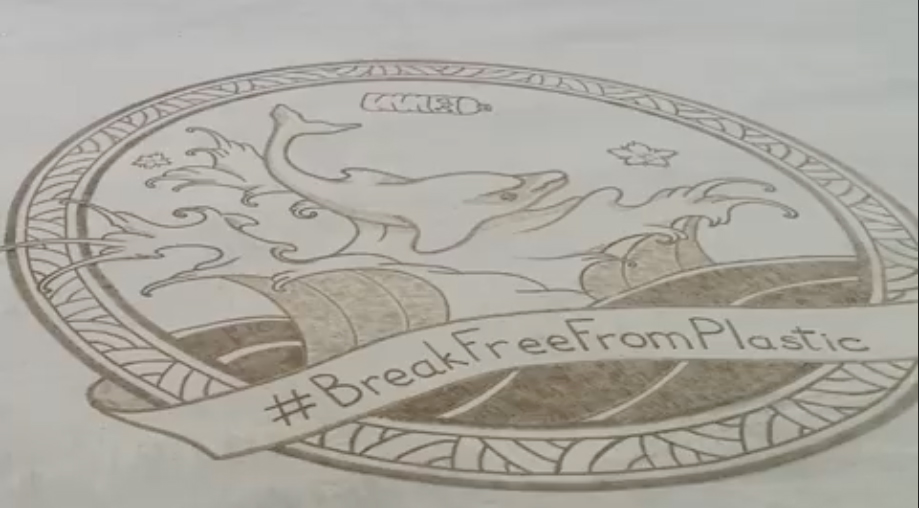On Earth Day 2018
Manila, Philippines (April 20, 2018) —As part of this year’s Earth Day celebrations, #breakfreefromplastic, a global movement backed up by more than 1,100 organizations, is urging governments worldwide to restrict or eliminate the use of single-use plastics (SUPs), stressing that the unrestrained production and consumption of disposable plastics is bringing on a plastic flood of crisis proportions.
Citing the lead of 36 countries and hundreds of cities and local government units around the world that have already imposed prohibitions or levies on the use of single-use plastics like plastic bags, straws, bottles, cups and cutlery, movement leaders pointed out that more countries and institutions are expected to follow suit as consumer attitudes change and public revulsion over plastic pollution intensifies.
“The good news is that more and more countries and cities are starting to take concrete measures to move their constituencies away from the nightmare of plastic pollution. We expect that increasing public awareness and anger on this issue will help galvanize other governments to do the right thing by restricting or prohibiting the use and proliferation of disposable plastics, especially when practical and ecological alternatives exist. Corporations that continue to dispense single-use plastics should start seeing the handwriting on the wall and respond by designing waste out of their products, ” said Von Hernandez, Global Coordinator of #breakfreefromplastic.
Taxing or putting levies on the use of SUPs like plastic bags or banning them outright have proven effective in encouraging consumers to shift to alternatives. Such policies are also compelling corporations and institutions to innovate and invest more in research on sustainable alternatives.
To commemorate Earth Day, #breakfreefromplastic member organizations around the world have initiated various activities asking corporations and governments to break free from plastic. Groups are taking “cleanups” a step further by identifying the brands responsible for plastic waste found on our beaches and beyond. The #breakfreefromplastic Brand Audit Toolkit is now available for those who plan to conduct a cleanup and brand audit in their respective areas. Last April 18, Greenpeace International also launched A Million Acts of Blue Toolkit which encourages individuals to push businesses, corporations, restaurants, and retailers to reduce their reliance on single-use plastics.
For his part, Froilan Grate, Regional Coordinator of Global Alliance for Incinerator Alternatives (GAIA) Asia Pacific stated that local governments must also enact more holistic, ecological, and sustainable policies that complement prohibitions on single-use plastics.
“Aside from banning the use of non-essential single-use plastic items, governments should also enact complementary policies that promote waste reduction and optimize recycling systems. In our experience, Asian cities that have embraced zero waste systems and programs have been able to demonstrate time and again the superiority of such strategies over the conventional dumping and disposal approaches,” Grate said.
Earlier this year, the European Union (EU) also adopted an EU-wide strategy on plastics as part of the union’s transition towards a more circular economy. Under this strategy, there are plans to make all plastic packaging recyclable by 2030 and reduce the consumption of single-use plastics while spurring innovations in the way products are designed, produced, used, and recycled in the EU.
“Previous EU legislation on plastic bags has been successful in reducing plastic pollution where it has been implemented. The potential to replicate this for other products and applications is huge and should be promoted. With the newly adopted strategy on plastics, we hope to see member states enact more policies that will curb the use of SUPs,“ said Delphine Levi Alvares, European Coordinator of #breakfreefromplastic .
In the United States, Martin Bourque, Executive Director of the Berkeley-based Ecology Center, said that China’s ban on plastic scrap is forcing West coast cities to find alternate solutions. He shared his organization’s experience in proposing an ordinance which will reduce use of disposable foodware in Berkeley, California.
“In Berkeley, we are proposing a Disposable-Free Dining ordinance to dramatically reduce our use of disposable foodware rather than trying to find new destinations for this problematic and hard-to-recycle material," Burque said. The Ecology Center runs the first curbside recycling program in the US, providing service to Berkeley residents since 1973.
About #breakfreefromplastic
#breakfreefromplastic is a global movement envisioning a future free from plastic pollution. Since its launch in September 2016, over 1,100 groups from across the world have joined the movement to demand massive reductions in single-use plastics and to push for lasting solutions to the plastic pollution crisis. These organizations share the common values of environmental protection and social justice, which guide their work at the community level and represent a global, unified vision.
Resources:
GP Press Release on Earth Day
Stemming the Plastic Flood BFFP report
BFFP Brand Audit Toolkit: https://www.breakfreefromplastic.org/brandaudittoolkit/
Greenpeace International A Million Acts of Blue: http://www.greenpeace.org/MillionActsOfBlue
Press release template:




